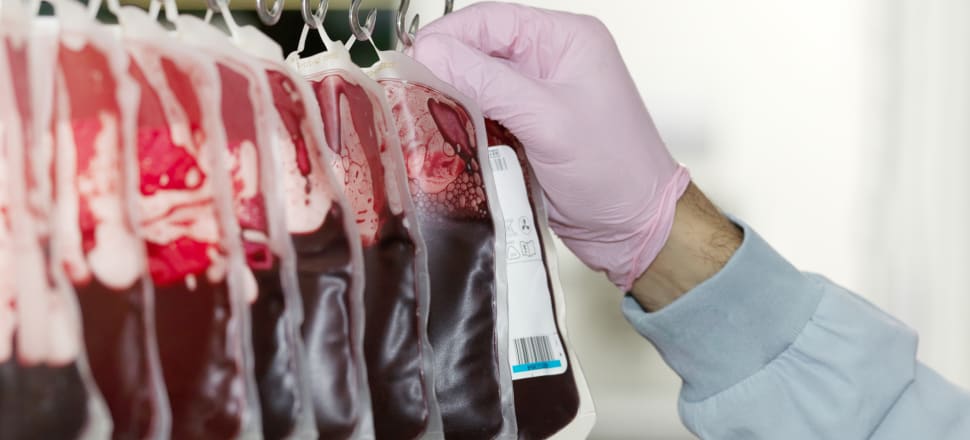
... as long as it’s been screened for safety by the NZ Blood Service
“Who has fully realised that history is not contained in thick books but lives in our very blood?” - Carl Jung.
Opinion: Blood transfusions have saved infinitely more lives than Sue Grey has won court cases. Yet, as I wade through the echo chamber of outrage, it's clear Liz Gunn hasn't thought those odds through. She backs Grey's conspiracy theories, full throttle. Her idea of balanced journalism differs from most.
She weeps, uses emotive language and calls for "unjabbed blood". She's almost funny, but the situation is far from it. It's hard not to notice similarities in her narrative with historical prejudice about blood.
Science has proved that the blood of a black man is the same as the blood of a white man. Despite that, human prejudice has ridden roughshod over factual findings. WWII (circa) Nazi Germany maintained an Aryan-only blood policy. The 'master race' had a preference for 'pure' blood. And, right up until the 1950s, American blood was segregated. Black people were prevented from donating blood, (but of course, they were welcome to spill it on the white man's battlefield).
READ MORE: * Compromise needed for sick baby, not 'vaccinated blood' arguments outside court * Covid-19: The fight for our blood supply
Despite scientists being clear that there was no relationship between race and blood, blood banks separated 'clean' and 'dirty' donations.
I feel dirty just writing those words.
Discrimination also tainted the gay blood bank. Globally, in the 1980s, heterosexual haemophiliacs receiving blood transfusions were contracting the 'gay-related immunodeficiency disease'.
Gay men were prevented from donating blood at a time when stigma was more powerful than science. However, it's not quite as simple as bias in that case. The rate of HIV transmission has declined, but the spread of HIV is more prevalent among gay men.
Of the 67 people diagnosed with HIV in NZ in 2021, 41 were gay males. Given the odds, the NZ Blood Service (NZBS) has taken a precautionary stance based on evidence.
Its job is to make sure donated blood is safe. NZBS states it holds no prejudice against a person's sexuality. Gay men can donate blood, but there is a stand-down period depending on your sexual activity.
"You need to wait three months following oral or anal sex, with or without a condom, with another man, or following use of PrEP, before you can donate."
Given the declining rates of HIV in New Zealand, that rule might change quite soon. But for now, it is merely a precaution designed to protect us should we ever need a blood transfusion.
So, as I sift through the dark silt of a comments section where people who call themselves 'purebloods', yelling for 'untainted' blood, I wonder how we got here again. Full circle on a roundabout with no exit.
Against medical advice, people are demanding 'pure' blood with such intensity you would think the strength of their conviction might magically change the NZBS evidence-based regulations and the wider law.
To be clear, it’s not just the NZBS that Liz Gunn and her drama squad are denying. They’re also going against hospital medical neglect policies. No matter how well-meaning the parents of the child are, medical neglect is usually multi-layered and comes in two clear forms which according to Starship Hospital can be fatal or lead to chronic disability.
- Failure to heed obvious signs of serious illness or;
- Failure to follow the health care plan from the health care team, once medical advice has been sought.
Having worked with vulnerable children in a health setting I understand the paramountcy principle. I’m surprised Sue Grey has overlooked this, being a lawyer and all. Not a doctor. Not a scientist. A lawyer with a less-than-desirable track record.
Under New Zealand law, the paramountcy principle is that “the child’s best interest and welfare is the first and paramount consideration”. Basically, if the child is suffering because the parents aren’t making the best decisions for their health, development or safety, the paramountcy principle can override ‘alternative’ or harmful views on child wellbeing.
Sadly, all Sue Grey and former TV presenter Liz Gunn are doing is delaying a distressed mother's baby from having an urgent, much-needed operation. They keep stirring that large pot of misinformation ... just waiting for it to boil over and leave a stain on our history.
I realise this is a grunty subject, and I've tried to keep it succinct, but it wouldn’t be well-rounded without mention of cultural and spiritual beliefs around blood.
“NZBS understand that from a Te Ao Māori perspective the body is considered tapu and values the sacredness of blood, and encourages Māori donors to perform a karakia to lift tapu when donating.”
Jehovah’s Witnesses, too, have beliefs about the sacredness of blood. As adults, it is their choice not to receive life-saving blood transfusions because it may mess up their chances getting into paradise.
And, that is absolutely their right.
But, remember the paramountcy principle?
Although adults can decide for themselves, they do not have the right under New Zealand law to decide the disability or death option for a child with no voice.
The experts in their various roles in the blood service, medical teams, legislation makers, scientists and social workers know their stuff. There is history and knowledge behind these decisions. There are protocols in place to protect public health and keep kids safe.
I trust that they know more about it than I do, and I definitely trust that they know more about it than Liz Gunn.







